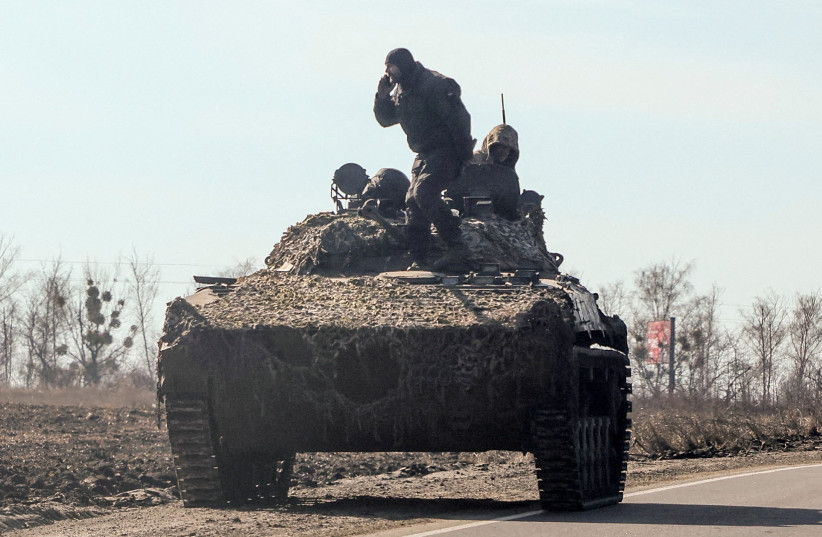Yulia’s son (name changed in this article due to safety concerns) serves alongside my son in the same brigade in the IDF. We are also both relatively new immigrants, having made aliyah with our families in recent years.
But that’s where the similarities between us end.
Unlike me, Yulia was not born and brought up in a free-thinking, Western democratic country.
She’s from Russia and, accordingly, her background is very different from mine.
Yulia and her family had a large apartment in St. Petersburg as well as a home in the country. She and her husband drove lovely cars and had good, respectable, well-paid jobs.

Three years ago, however, they gave up their comfortable life in Russia as they did not want their three children to be living under the yoke of President Vladimir Putin’s “crazy regime” any longer. Instead, she says, they wanted them to be “free and part of this world,” something that was simply not possible living in Russia.
Although she and her family didn’t suffer any kind of antisemitism in St. Petersburg, this may have been due to the fact that nationality and religion were taboo subjects and never discussed.
While Yulia does not believe that Putin himself is antisemitic, she is aware that things could change at any moment for Jews living there. In her own words, “when bad times come, the first to be blamed are the Jews.”
She speaks from the bitter experience of her own family.
Yulia’s father and his family suffered greatly during Stalin’s reign. Her paternal grandfather was marked out as an enemy of the state and was captured and interned in one of the camps. There, he was persecuted and murdered, while his son, Yulia’s father, was still a baby, thus forcing Yulia’s grandmother into hiding with her infant son. While in hiding, she changed his name in a bid to save him.
Although Yulia’s father knew that he came from a Jewish family, he never spoke of it in his formative years. He and his family kept their Jewish roots largely under wraps.
It wasn’t until a few years ago when she was going through the KGB archives to prepare the documents for aliyah, that Yulia learned the whole tragic story about her father and his parents.
Although her parents still live in St Petersburg, they visit her regularly for three to four months at a time. Her father is proud that his daughter and her family now live here in Israel.
That said, Yulia told me, very matter of factly, that, although her father is Jewish, her mother is not and therefore, neither is she (according to some), “My father is Jewish so I am not,” she said.
This is not something that grieves her, as religion has never played a part in her life, even as a child growing up with a Jewish father. It is only now, as an Israeli immigrant, that Yulia has finally been given the opportunity to learn about her Jewish heritage, something about which she is delighted.
Her good friend from Melbourne is helping her on this journey by teaching her about the Jewish traditions, which even the most irreligious among us would take for granted.
Yulia believes that what is happening today in Russia is a disaster for everyone, including the Russians themselves. There is not one person among her friends, relatives and acquaintances who does not share her view, she says.
She and others like her who have been fortunate enough to be able to make aliyah feel that they are the lucky ones. They have been able to escape from a country that is ruled by a dictator and is fast becoming isolated from the rest of the world.
The turning point for Yulia and her family came in 2014 while living outside of Russia for a short time through her husband’s job. They were invited by the American consulate there to join them for St. Patrick’s Day celebrations along with the rest of her husband’s colleagues and their families.
She was shocked and dismayed to find that she and her family were shunned at the party. No one was prepared to talk to them on account of Russia’s annexation of Crimea two weeks prior.
Having suffered this embarrassment and humiliation, they made the decision to leave Russia permanently, as they did not want their children to suffer a similar fate, namely, being blamed for Putin’s aggression.
They wanted their children to be a part of the wider world and not to live in a country that was fast becoming akin to North Korea.
And so, at the ripe old age of 48, Yulia, her husband and their three children left behind their comfortable lives in St. Petersburg and made aliyah.
Theirs was not an easy journey, as none of them spoke Hebrew. Further, they had neither jobs nor a home to go to when they arrived here. Nevertheless, they did it in the hope of securing a freer and more fruitful life for themselves and, more importantly, their children.
In light of the appalling events of the past two weeks, Yulia and her husband feel vindicated by their decision to leave their country of birth. Apart from anything else she will not have to face the horrific prospect of one of her family being arrested for protesting or, worse still, her son being called upon to fight in the Russian army against their friends in neighboring Ukraine.
Instead, in a further twist of fate, Yulia’s eldest child now serves alongside Ukrainians in the IDF.
As Yulia states, “My son is serving in the IDF alongside the Ukrainians... We have friends and family there as many, many other Russians and Russian Jews do. We are deeply concerned.”
The writer is a former lawyer from Manchester, England. She now lives in Netanya, where she spends most of her time writing and enjoying her new life in Israel.
